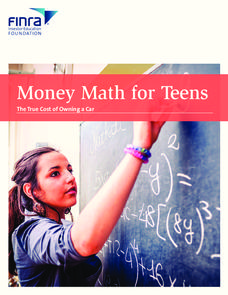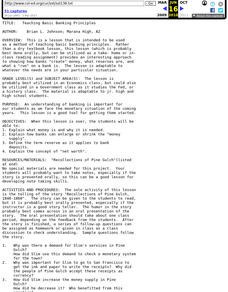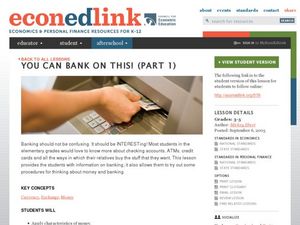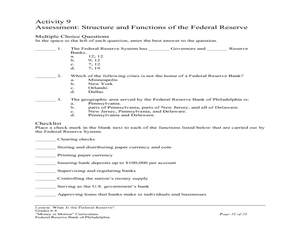Youthlinc
Financial Literacy: Money Attitudes Lesson Plan
Going once, going twice, sold! An auction provides class members with an opportunity to examine their attitudes toward money. After bidding on and purchasing items, individuals complete an attitude survey and then identify a goal that...
DECA
Sample Exam: Personal Financial Literacy
Looking for a way to assess pupils' personal financial literacy? A 100-question, multiple-choice exam provides a good understanding of what class members already know and need to know about personal finance.
Visa
Hall of Fame Lesson Module — Financial Football
Kick off an engaging review on personal finance with an online football game. Financial Football incorporates both football strategies and economic knowledge in an interactive format, allowing future CFOs to answer a variety of questions...
Visa
Pro Lesson Module — Financial Football
Learners won't fumble their knowledge of personal finance after an engaging game of Financial Football! As they choose their favorite teams and desired plays, young economists demonstrate their financial literacy with a question ranging...
EngageNY
The Mathematics Behind a Structured Savings Plan
Make your money work for you. Future economists learn how to apply sigma notation and how to calculate the sum of a finite geometric series. The skill is essential in determining the future value of a structured savings plan with...
SaveandInvest.org
The True Cost of Owning a Car
Almost every teen wants a car, but can they really afford one? The lesson walks pupils through how to identify a budget, find all of the costs associated with car ownership, and determine if they should buy the car or keep looking.
Federal Reserve Bank
Financial Fables: Shopping Wisely with Olivia Owl
Cover two subjects with one lesson! First, dive into English language arts; read an eBook, answer comprehension questions, and complete a cause and effect chart about the financial fable, Shopping Wisely with Olivia Owl. Then, take a...
Practical Money Skills
Living on Your Own
Every teen dreams of living independently, but often without thinking about the details and costs involved with moving out. Three lessons in a unit about living on your own focus on moving costs, fixed and flexible costs associated with...
Curated OER
Susan's Choice
Young economists explore opportunity cost by counting how much money Susan has in her piggy bank. From here, they are challenged to help Susan make a choice about what she can buy with her money.
University of Missouri
Money Math
Young mathematicians put their skills to the test in the real world during this four-lesson consumer math unit. Whether they are learning how compound interest can make them millionaires, calculating the cost of remodeling their bedroom,...
Visa
Cars and Loans
What's the best way to pay for a car? Should I buy used or new? Can I realistically afford a car? Pupils discover the ins and outs of buying a car, from how to shop for car insurance to the advantages and disadvantages of leasing.
Federal Reserve Bank
Keep the Currency
Each day, people throw currency away in different ways because of a lack of financial knowledge. Introduce your learners to the importance of financial literacy and assess their understanding of banking and personal finance.
Federal Reserve Bank
Financial Regulation: A Primer on the Dodd-Frank Act
Get the lowdown on the most sweeping financial regulatory reform since the Great Depression: the Dodd-Frank Wall Street Reform and Consumer Protection Act of 2010.
Federal Reserve Bank
Traditional Versus Shadow Banking
Here is a detailed breakdown of the traditional banking system, including the roles that intermediaries play as brokers and in making loans, as well as an introduction to the parallel system of shadow banking.
Curated OER
Chapter 14: How Banks and Thrifts Create Money
Teach your class about the value of a dollar in this economics presentation, which details the inner-workings of commercial banks. From reserve requirements to money expansion, these slides will clear up any misconceptions about "the...
Curated OER
Teaching Basic Banking Principles
Students listen to the story, "Recollections of Pine Gulch, 1840-1860" to determine how banks "create" money, what reserves are, and what a "run" on a bank is.
Curated OER
Savings Account Introduction Lesson
This teaching tool promotes a practical understanding of basic mathematical skills by having learners determine percents on interest. There are several worksheet options available as well as a guid on how best to use them.
Curated OER
Advanced Crossword Puzzle - Banking
In this banking crossword puzzle instructional activity, students use the 10 clues to fill in the blanks in the crossword puzzle with the appropriate answers.
Curated OER
Bank Tellers and Math
Second graders learn what math skills bank tellers need to do their jobs correctly.
Curated OER
A Basket of Bangles: How a Business Begins
Students consider concepts of banking introduced in the story, "Basket of Bangles." In this banking instructional activity, students identify key terms through recall questions interspersed in the story. Using five handouts and a game,...
Curated OER
Show Me The Money!
Students select which bank would best meet their needs. In this lesson plan on personal banking, students write a summary stating which bank and bank accounts best suit their own needs.
Curated OER
The Catastrophe Clan
Students participate in a financial project and identify the three c's of credit. In this credit card lesson, students define and understand how to use credit wisely. Students become familiar with banking terms and types of credit. ...
Council for Economic Education
You Can BANK On This! (Part 1)
Students investigate the concepts of money management and banking through Internet activities. In this economics lesson plan, students discuss the characteristics of money and how people once bartered with goods instead of paying with...
Curated OER
What Is the Federal Reserve?
Students examine simple bank transactions. In this banking lesson, students analyze banking transactions such as deposits, loans, and how they hold reserves. They participate in simulations of the process of clearing a check and the...

























